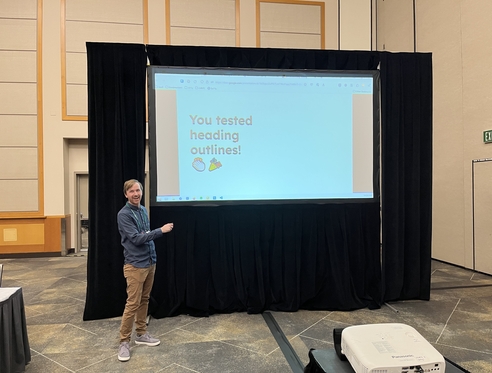We notice that behind each of our most data-driven clients is a database admin who loves their job. We were curious about what made them love their jobs, so we asked three client admins, Angela Bailey, Jack Holzman, and Ananda Robie. Here are three essential organizational qualities they identified:
1. Leadership values data and uses it to make strategic decisions
The best admins are drawn to work with nonprofits because of their affinity to a mission and their desire to make an impact. And the most successful nonprofit leaders are using data to guide their organizations. So, when you have both a data-hungry executive or program director and a mission-focused admin, the results are magic, both for the goals of the organization and extending tenure for admins. Knowing they are critical to their organization’s mission is a key ingredient in the secret sauce that keeps admins inspired and engaged for the long haul.
An admin’s role should include strategic thinking about the data they’re stewarding, which both ensures a commitment to data hygiene and takes advantage of an admin’s unique insight on what’s possible. Are there patterns to volunteer engagement that field staff should be noticing? Which supporter journeys are the most successful? Is there another angle from which fundraising staff should be assessing donor behavior? What’s the perfect dashboard for the policy committee to stay abreast of legislative decisions?
Admins feel more connected and critical to the success of their organization when organization leaders are hungry for the right data. We see a direct correlation between leadership ambivalence about informing decisions with data and high admin turnover (and organization underperformance…but that’s another blog post!)
2. The admin’s role is clearly defined and well-respected
Forget the old stereotype of IT nerds hidden in dusty server rooms! A successful admin has a keen understanding of how their organization and peers work. Open and deliberate collaboration with staff helps them identify problems and informs overall data strategy (which is why the best admins are outgoing and empathetic!)
Successful collaboration, from the admin’s point of view, requires teams that:
- Recognize the admin’s role and importance for the organization’s success
- Understand that data management is a part of their job
- Have good change management practices
- Are open to collaboration in the first place, including allocating the needed time for troubleshooting and planning
Other things that admins love are seeing busy colleagues maintain their commitment to data management, and being approached with new ideas or with requests for new reports. Smart organizations support great working relationships between staff and admins by setting expectations and giving the admin role authority. When admins work in such an environment, they know their work is appreciated, which they say is incredibly motivating.
3. The organization budgets adequately for tools, professional development, and external support
Maintaining a useful database requires a consistent investment of both time and money. This means paying for good apps and add-ons, allocating enough staff time (admins, super users, and everyone!) toward information management, and using external consultants that can answer questions or help admins overcome roadblocks. Admins that have enough time and resources to do their jobs well are happy and stick around. Getting the resources they ask for demonstrates the organization’s commitment to their work.
Admins aren’t ‘done’ learning technicals skills at any point in their career. They are looking for opportunities to try new tools and gain new skills. Good tech budgets and staff plans include sufficient funds and time for continuing education opportunities or conferences. These don’t always have to be expensive: local user groups offer many opportunities for networking with other nonprofit admins and experts. Fostering professional connections guarantees continued growth and creativity throughout an admin’s tenure.
Be successful.
There’s a symbiosis between the data-driven organization and a happy admin. If your organization struggles to recruit or retain good admins, it may be time to question how your organization values data and/or review the way you’re thinking about the database administrator role.



